昔日文章
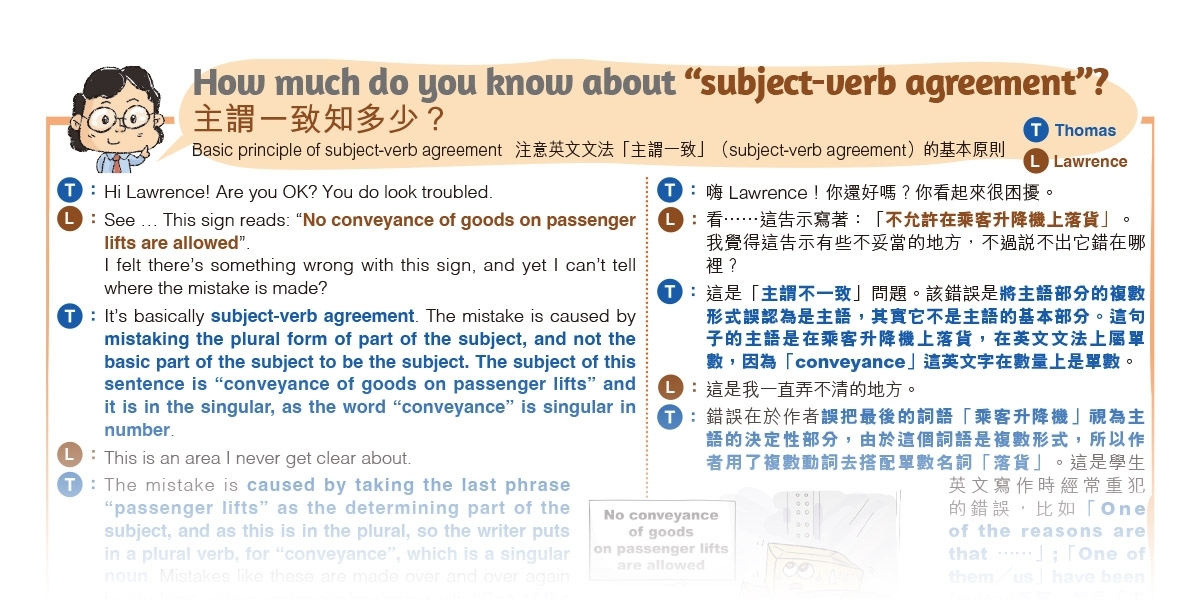
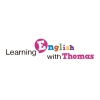
Learning English with Thomas
2023.03.12
How much do you know about “subject-verb agreement”?
主謂一致知多少?
Basic principle of subject-verb agreement 注意英文文法「主謂一致」(subject-verb agreement)的基本原則
T: Thomas L: Lawrence
T: Hi Lawrence! Are you OK? You do look troubled.
L: See … This sign reads: “No conveyance of goods on passenger lifts are allowed”. I felt there’s something wrong with this sign, and yet I can’t tell where the mistake is made?
T:
It’s basically subject-verb agreement. The mistake is caused by mistaking the plural form of part of the subject, and not the basic part of the subject to be the subject. The subject of this sentence is “conveyance of goods on passenger lifts” and it is in the singular, as the word “conveyance” is singular in number.
L: This is an area I never get clear about.
T:
The mistake is caused by taking the last phrase “passenger lifts” as the determining part of the subject, and as this is in the plural, so the writer puts in a plural verb, for “conveyance”, which is a singular noun. Mistakes like these are made over and over again by students writing sentences beginning with “One of the reasons are that ……”; “One of them/us” have been invited”, and so on. All these are examples of mistakes in subject-verb agreement.
L: From now on I will avoid making mistakes in this area.
T: 嗨 Lawrence!你還好嗎?你看起來很困擾。
L: 看……這告示寫著:「不允許在乘客升降機上落貨」。我覺得這告示有些不妥當的地方,不過說不出它錯在哪裡?
T: 這是「主謂不一致」問題。該錯誤是將主語部分的複數形式誤認為是主語,其實它不是主語的基本部分。這句子的主語是在乘客升降機上落貨,在英文文法上屬單數,因為「conveyance」這英文字在數量上是單數。
L: 這是我一直弄不清的地方。
T: 錯誤在於作者誤把最後的詞語「乘客升降機」視為主語的決定性部分,由於這個詞語是複數形式,所以作者用了複數動詞去搭配單數名詞「落貨」。這是學生英文寫作時經常重犯的錯誤, 比如「One of the reasons are that ……」;「One of them╱us」have been invited等等,都是「主謂不一致」的例子。
L: 今後我會盡量避免出現這方面的錯誤了。
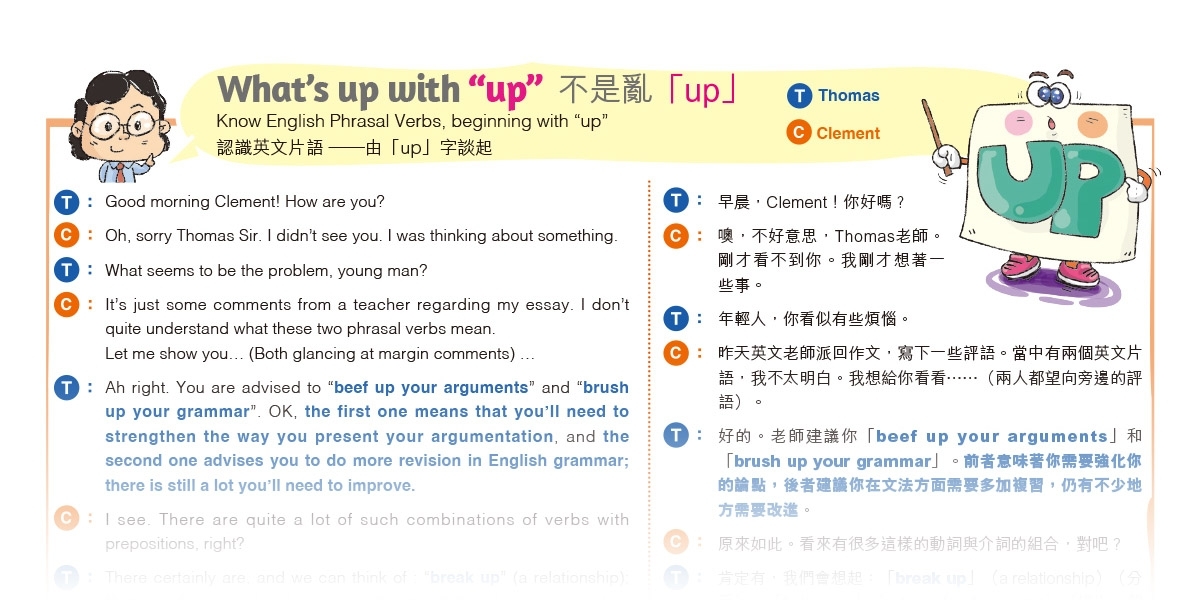

Learning English with Thomas
2023.02.05
What’s up with “up” 不是亂「up」
Know English Phrasal Verbs, beginning with “up”
認識英文片語 ——由「up」字談起
T : ThomasC C : Clement
T: Good morning Clement! How are you?
C: Oh, sorry Thomas Sir. I didn’t see you. I was thinking about something.
T: What seems to be the problem, young man?
C: It’s just some comments from a teacher regarding my essay. I don’t quite understand what these two phrasal verbs mean.
Let me show you… (Both glancing at margin comments) …
T: Ah right. You are advised to “beef up your arguments” and “brush up your grammar”.
OK, the first one means that you’ll need to strengthen the way you present your argumentation,
and the second one advises you to do more revision in English grammar; there is still a lot you’ll need to improve.
C: I see. There are quite a lot of such combinations of verbs with prepositions, right?
T: There certainly are, and we can think of : “break up” (a relationship); “bring up” (a topic for discussion); “look up” (the dictionary); and so on.
C: Thanks so much, Thomas Sir. I’ve got to go now. Tell me more next time.
T: 早晨,Clement!你好嗎?
C: 噢,不好意思,Thomas老師。剛才看不到你。我剛才想著一些事。
T: 年輕人,你看似有些煩惱。
C: 昨天英文老師派回作文,寫下一些評語。當中有兩個英文片語,我不太明白。我想給你看看……(兩人都望向旁邊的評語)。
T: 好的。老師建議你「beef up your arguments」和「brush up your grammar」。前者意味著你需要強化你的論點,
後者建議你在文法方面需要多加複習,仍有不少地方需要改進。
C: 原來如此。看來有很多這樣的動詞與介詞的組合,對吧?
T: 肯定有,我們會想起:「break up」(a relationship)(分手);「bring up」(a topic for discussion)(提出一個課題作討論);
「look up」(the dictionary)(查字典) 等等。
C: 十分感謝你,Thomas老師。我現在要走了。下次再多加指點。
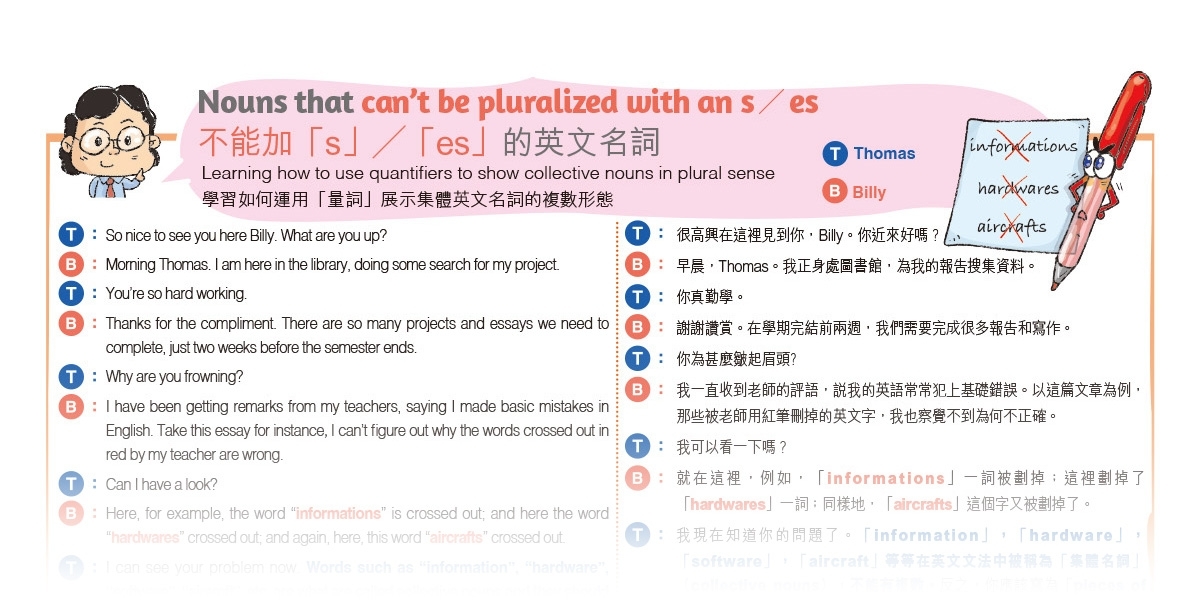

Learning English with Thomas
2023.01.15
Nouns that can’t be pluralized with an s ╱ es
an s ╱ es 不能加「s」╱「es」的英文名詞
Learning how to use quantifiers to show collective nouns in plural sense
學習如何運用「量詞」展示集體英文名詞的複數形態
T : Thomas B : Billy
T : So nice to see you here Billy. What are you up?
B : Morning Thomas. I am here in the library, doing some search fo rmy project.
T : You’re so hard working.
B : Thanks for the compliment. There are so many projects and essays we need to complete, just two weeks before the semester ends.
T : Why are you frowning?
B : I have been getting remarks from my teachers, saying I made basic mistakes in English. Take this essay for instance, I can’t figure out why the words crossed out in red by my teacher are wrong.
T : Can I have a look?
B : Here, for example, the word “informations” is crossed out; and here the word “hardwares” crossed out; and again, here, this word “aircrafts” crossed out.
T : I can see your problem now. Words such as “information”, “hardware”, “software”, “aircraft”, etc. are what are called collective nouns and they should not be pluralized. Instead, you should write “pieces of information”. For “hardware” you’d say “hardware systems”; and for “aircraft” you’d say “units of aircraft”. Such nouns in English usage need quantifiers to show a plural sense.
B : I see. That’s something I must bear in mind from now on. Thanks so much for the explanation.
T : 很高興在這裡見到你,Billy。你近來好嗎?
B : 早晨,Thomas。我正身處圖書館,為我的報告搜集資料。
T : 你真勤學。
B : 謝謝讚賞。在學期完結前兩週,我們需要完成很多報告和寫作。
T : 你為甚麼皺起眉頭﹖
B : 我一直收到老師的評語,說我的英語常常犯上基礎錯誤。以這篇文章為例, 那些被老師用紅筆刪掉的英文字,我也察覺不到為何不正確。
T : 我可以看一下嗎?
B : 就在這裡, 例如, 「i n f o r m a t i o n s 」一詞被劃掉; 這裡劃掉了 「hardwares」一詞;同樣地,「aircrafts」這個字又被劃掉了。
T : 我現在知道你的問題了。「information」,「hardware」, 「software」,「aircraft」等等在英文文法中被稱為「集體名詞」(collective nouns),不能有複數。反之,你應該寫為「pieces of information」。至於「hardware」,您可以用「hardware systems」(硬件系統);而「aircraft」可以說成「units of aircraft」(飛機單位)。這些名詞,在英文運用上,要加上「量詞」(quantifiers)才能量化。
B : 原來如此。我今後必須牢記這些的知識。非常感謝您的講解。
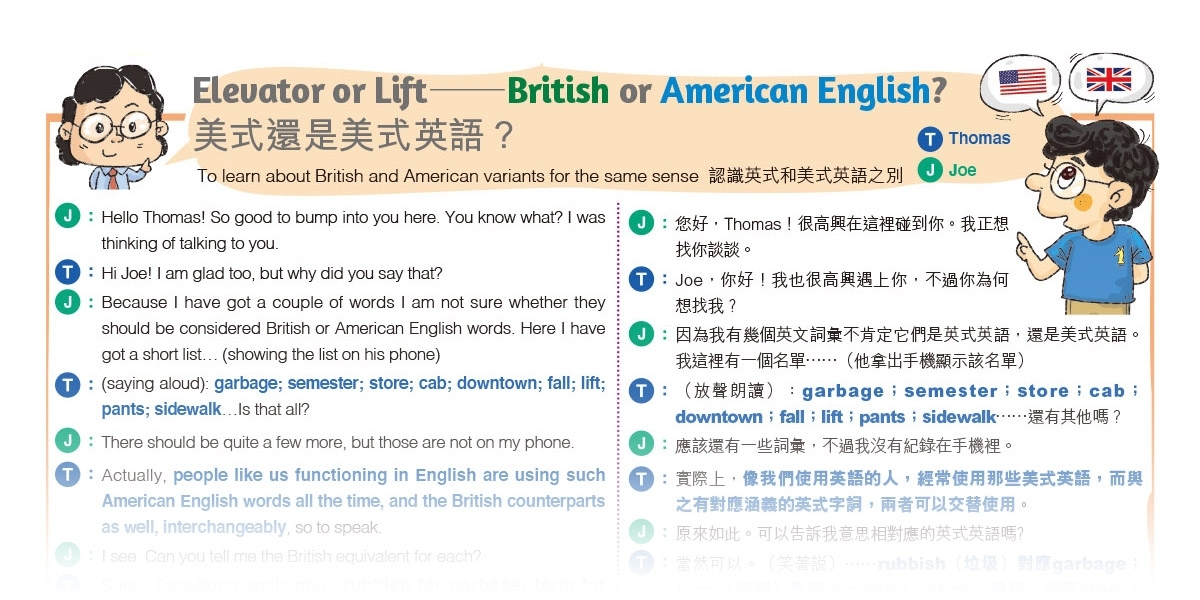

Learning English with Thomas
2022.11.27
Elevator or Lift —— British or American English?
美式還是美式英語?
To learn about British and American variants for the same sense 認識英式和美式英語之別
T : Thomas J : Joe
J : Hello Thomas! So good to bump into you here. You know what? I was thinking of talking to you.
T : Hi Joe! I am glad too, but why did you say that?
J : Because I have got a couple of words I am not sure whether they should be considered British or American English words. Here I have got a short list… (showing the list on his phone)
T : (saying aloud): garbage; semester; store; cab; downtown; fall; lift; pants; sidewalk…Is that all?
J : There should be quite a few more, but those are not on my phone.
T : Actually, people like us functioning in English are using such American English words all the time, and the British counterparts as well, interchangeably, so to speak.
J : I see. Can you tell me the British equivalent for each?
T : Sure…(speaking smilingly)…rubbish for garbage; term for semester; shop for store; taxi for cab; town centre for downtown; autumn for fall; elevator for lift; trousers for pants; and pavement for sidewalk.
J : That’s another lesson for me today. Shall we go for lunch together?
J : 您好,Thomas!很高興在這裡碰到你。我正想找你談談。
T : Joe,你好!我也很高興遇上你,不過你為何想找我?
J : 因為我有幾個英文詞彙不肯定它們是英式英語,還是美式英語。我這裡有一個名單……(他拿出手機顯示該名單)
T :(放聲朗讀):garbage;semester;store;cab; downtown;fall;lift;pants;sidewalk……還有其他嗎?
J : 應該還有一些詞彙,不過我沒有紀錄在手機裡。
T : 實際上,像我們使用英語的人,經常使用那些美式英語,而與之有對應涵義的英式字詞,兩者可以交替使用。
J : 原來如此。可以告訴我意思相對應的英式英語嗎﹖
T : 當然可以。(笑著說)……rubbish(垃圾)對應garbage; term(學期)對應semester;shop(商店)對應store; taxi(計程車)對應cab;town centre(市中心)對應downtown;autumn(秋天)對應fall;elevator(升降機) 對應 lift;trousers(長褲)對應 pants;and pavement(行人路)對應 sidewalk.
J : 今天又上了一課。不如我們一起吃午餐?


